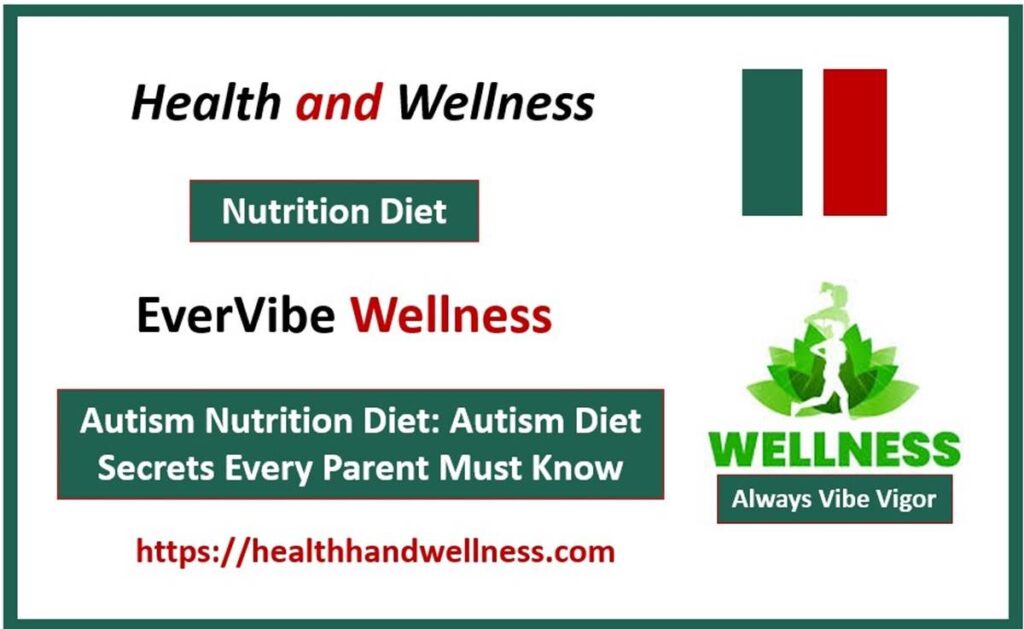Autism Nutrition Diet is a condition that affects how a person communicates, behaves and learns. Children and adults suffering from autism may have special requirements when it comes to food. It is very important to eat healthy food for people suffering from autism.
A good diet can help them feel better, focus more focus and stay strong. In this article, we will talk about the best diet for autism, important nutrients, how to be healthy with autism, and the best lifestyle for someone with autism.

What is the best diet for autism?
There is no “right” diet for autism, but many people suffering from autism feel better when they eat some foods and avoid others. Here are some diets that many parents try autism for their children:
1. Gluten-Free and Casein-Free Diet (GFCF)
- Gluten is found in wheat, barley and rye.
- Casein is found in milk and dairy products.
- Some children suffering from autism may feel better when they do not eat them.
- Parents say that their children get less problems, better behavior and better sleep.
2. Low sugar and no junk food
Excess sugar and junk food can make children feel tired, moody or hyper. Eating less sugar can help the child focus better and feel calm. Autism Nutrition Diet
3. Complete Food Diet
This means that real food should be eaten:
- Fruits and vegetables
- Brown rice, oat and sweet potato
- Chicken, fish, eggs and beans
- Avoid foods with many chemicals, colors or preservatives. These can affect mood and behavior.
4. Omega -3 rich foods
Omega -3 is good for the brain. It is found in:
- Fish (eg salmon and tuna)
- Chia seed
- Walnut
- These foods can help children suffering from autism to learn better and feel calm.
What is the need for nutrients for autism?
Autism and adult Autism Nutrition Diet may not be sufficient for some important nutrients. The right vitamin and mineral foods help your brain, body and mood.
1. Vitamin D
- It helps you feel and think. It is found in the sunlight, fish and eggs.
2. magnesium
- It helps you sleep, stress, and behaviour.
- Spinuts, seeds, bananas and nuts found.
3. Vitamin B6 and B12
- It helps with the nervous system and thinking.
- Found in meat, fish, potatoes and bananas.
4. calcium
- It holds the bones strongly. Autism Nutrition Diet
- Almonds or soy milk are available in milk-free and leaf milk.
5. zinc
- It helps your taste, smell and immune system.
- It can be found in meat, beans and seeds.
6. fiber
- It helps digestion and prevents constipation. Fruits, vegetables, oats and whole grain products found.
- Doctors may be able to suggest vitamin dosages when the child is cucumber.
How to stay healthy with Autism Nutrition Diet?
Being healthy is not just about food. It also includes daily habits, comfort, and how someone feels. Here are the ways to help someone to stay healthy with Autism Nutrition Diet:
1. Eat regular food
Eating at the same time each day makes the body feel safe. Try to have breakfast, lunch, dinner and small snacks. Autism Nutrition Diet
2. Stay hydrated
Water is very important. Many children suffering from autism forget to drink water. Give them fun cups or water bottles to encourage drinking.
3. Get enough sleep
Sleep helps to grow and cure the brain. try:
- A gold routine (such as brushing teeth and reading a book)
- No screen a screen one hour before sleep
- Cool music or soft light Autism Nutrition Diet
4. Exercise daily
Transferring the body helps with mood, focus and health. try:
- Walking
- dance
- float
- Jump on a trumpoline
- Even 20-30 minutes a day makes a big difference.
5. Manage stress
Some children with autism easily feel stressed. Help them relax:
- Deep breath
- Listen
- Play with sensory toys
- If they like it then they are throat or pressing
What is the best lifestyle for autism?
Living a good life with autism means a routine, support and a healthy environment. Here are some lifestyle suggestions for Autism Nutrition Diet for children and adults:
1. Routine and structure
- People suffering from autism like to know what comes next.
- A daily program helps reduce anxiety.
- Use pictures or charts for daily tasks
- Keep small changes and explain them
- Help them planning a schedule
2. Safety and cool environment
- A cool place helps with focus and cool feelings.
- Use soft lights and soft colors
- Reduce loud noise
- Give a cool corner to the brake
3. Positive social support
It helps in understanding kind and people. to encourage:
- Play with friendly children
- Help group for parents and families
- Medical or group classes for learning skills
4. Therapy and learning support
Some children suffering from autism do better with help:
- speech therapy
- occupational therapy
- Behavior
- These help in talking, moving forward and behaving better.
5. Technology and Apps
There are many fun and helpful apps that teach skills in a fun way. They can help with:
- Learning to speak
- Recognizing emotions
- Following instructions
Tips for Parents
- Be patient – changes take time. Autism Nutrition Diet
- Involve the child in picking healthy foods.
- Talk to doctors or dietitians before making big diet changes.
- Start slow – remove one food at a time and see what happens.
- Celebrate small wins – every little step matters.
Conclusion
Autism affects every person differently. But one thing is true: good nutrition and a healthy lifestyle can really help. Eating whole foods, avoiding certain things like gluten or sugar, and getting the right vitamins can make a big difference.
Parents and caregivers play a big role. With love, patience, and the right food, children with autism can grow stronger, think clearer, and feel happier.